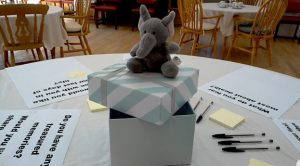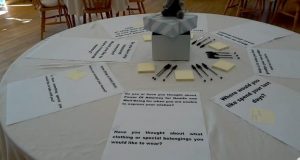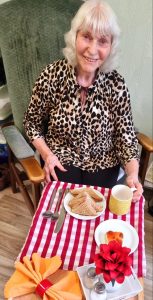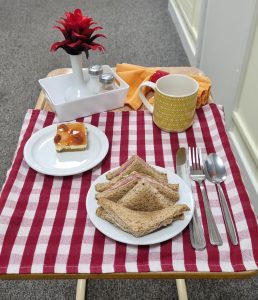Read House: Improving the dining experience & addressing death – the ‘elephant in the room’
Charlotte Garner is the Deputy Manager at Read House in Frinton, Essex.
We met Charlotte when she took part in a My Home Life England Professional Development and Support programme in Essex. She shared with us 2 great pieces of practice that have been recently implemented at Read House, with real impact!
Dying – the ‘elephant in the room’
“At Read House we reflected on the Gold Standard Framework training staff had previously attended and how we could make Death a more approachable subject to talk about.
We’re aiming to help break down the stigma and taboo that still exists around dying and supporting people to have conversations about what their final wishes are.
 We are all born, we all live and we all die – it will happen, and so it’s important that we have conversations around it.
We are all born, we all live and we all die – it will happen, and so it’s important that we have conversations around it.
I held an afternoon called ‘elephant in the room.’
I ran an exercise inviting people, plus family members and loved ones, to discuss ‘what do you fear most?’ ‘What are your funeral wishes?’ – just a time for everyone to talk about what they wish for their last days of life and their own funeral.
I set up circular tables with pieces of paper and post-it notes for writing down thoughts. Plus I put a soft toy elephant on the table – a physical reminder of ‘the elephant in the room’.
 One lady said “I don’t care what I’m buried in, so long as I have a clean pair of knickers!”
One lady said “I don’t care what I’m buried in, so long as I have a clean pair of knickers!”
Another son said – “thank you, I didn’t know what my mum’s wishes were. I thought she wanted to have her ashes sent back to Jamaica. I didn’t know she wanted to be buried in lilac.” He then spent the next few weeks speaking to her, so he was certain he knew what her wishes were.
We need to remember that we all make our own decisions throughout our life, so why are we not making this last, final and just-as-important decision around our own end of life?
Staff are now more open about starting discussions around end of life. It’s now a much bigger focus in care plans, whereas previously it wasn’t something we particularly encouraged conversations about.
Finding out the small, finer details, rather than just the basic information, lets the family know that the funeral is what their loved one wanted. This helps with the grieving process.”
Dining experience training
“Also at Read House we wanted to see how we could improve nutrition and hydration. We spoke to older people and observed mealtimes and we came up with the ‘dining room experience.’
Some individuals at Read House choose to eat in their bedroom, rather than in a dining room. This includes people who are fearful of noises. Some are embarrassed as to how they eat. It’s a personal choice.
But people choosing to eat in their rooms should still get to have a ‘dining experience’ and enjoy it.
Meals in bedrooms used to just get placed on the over-bed tables, without making the table clear and ready for a meal. So people were missing out on the dining experience that they would have in the dining room – with a laid tablecloth, cutlery, serviette, etc.
But you eat with your eyes – if you don’t like what you see, if it’s not presented nicely and with interesting textures, then you’re more likely to think ‘I can’t be bothered with this’ and leave the meal, which can result in many other health complications.
 Now we serve meals on a tray. We clear a person’s belongings from the table and we put down a large gingham serviette, a salt and pepper basket and a flower.
Now we serve meals on a tray. We clear a person’s belongings from the table and we put down a large gingham serviette, a salt and pepper basket and a flower.
Other people have their own little dining room table in their bedroom, all set-up and it creates a dining atmosphere.
Through observations of the dining room experience, we’ve seen improvements in the amount that people are eating.
They seem to be happier and more themselves, enhancing their emotional wellbeing. It has helped with feelings of ‘being a burden’ or a nuisance to be reduced. It has shown older people that staff really care.”
Thank you to Charlotte and the Read House team for sharing this with us! Read House is owned by Memory Lane Care Homes.
